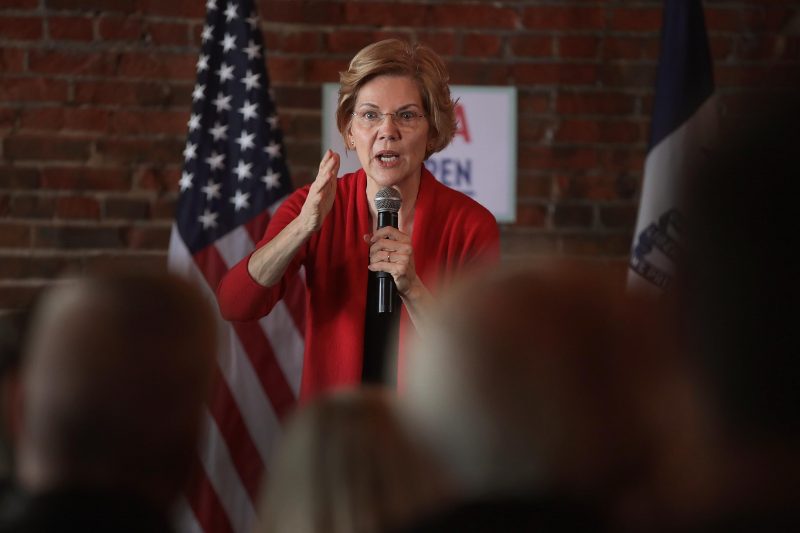White House hopeful Elizabeth Warren unveils Big Tech breakup plan
Senator Elizabeth Warren, who is seeking the 2020 Democratic presidential nomination, unveiled a proposal to break up Big Tech firms Google, Facebook and Amazon (SCOTT OLSON)
Washington (AFP) – Democratic presidential hopeful Elizabeth Warren unveiled a proposal Friday to break up Big Tech, arguing that firms such as Amazon, Google and Facebook hold “ too much power” in society.
Warren said that as president, she would press for legislation to designate big online companies with revenues of at least $25 billion as “platform utilities” barred from owning “any participants on that platform.”
The Massachusetts senator seeking her party’s nomination for 2020 said she would also appoint antitrust enforcers “committed to reversing illegal and anti-competitive tech mergers,” including acquisitions in recent years by Amazon, Facebook and Google.
“Today’s big tech companies have too much power — too much power over our economy, our society and our democracy,” she wrote in a blog post on Medium ahead of a New York rally where she was to speak about the plan.
“They’ve bulldozed competition, used our private information for profit, and tilted the playing field against everyone else.”
The proposal comes amid a growing “techlash” movement in the United States against the firms, which have grown to become the world’s most valuable, and a series of antitrust investigations in Europe.
Critics accuse the firms of mishandling private user data and of abusing their dominance of certain sectors such as online retail and internet search.
– ‘Unwinding’ tech tie-ups –
Warren specifically said she would seek to unwind Amazon’s acquisition of the Whole Foods grocery chain and shoe retailer Zappos, Facebook’s WhatsApp and Instagram, and Google’s integration of the ad tech firm DoubleClick, internet of things maker Nest and mobile navigation application Waze.
“Unwinding these mergers will promote healthy competition in the market — which will put pressure on big tech companies to be more responsive to user concerns, including about privacy,” she wrote.
Warren said Amazon Marketplace, Google’s ad exchange and Google Search would be considered platform utilities under her proposal.
By doing this, she said, “small businesses would have a fair shot to sell their products on Amazon without the fear of Amazon pushing them out of business.”
– Help or hurt consumers? –
Warren’s plan sparked swift reaction from both sides of the issue.
The Computer & Communications Industry Association, which represents the three firms cited by Warren, disputed her analysis.
The “unwarranted and extreme proposal, which focuses on a highly admired and highly performing sector, is misaligned with progressive values, many of which are shared within the tech industry,” CCIA president Ed Black said.
– ‘Big is bad’ mentality –
Robert Atkinson, president of the Information Technology & Innovation Foundation, a think tank that follows the sector, said the plan “is not pro-consumer.”
Warren’s plan “reflects a ‘big is bad, small is beautiful’ ideology run amok,” Atkinson said.
“The proposal ignores the fact that many of the services big tech companies now provide free used to cost consumers money.”
But Matt Stoller of the Open Markets Institute, a group focused on competition in the tech sector, said the plan is “moderate” and long overdue.
“Keep in mind the Sherman Act is not just a civil statute but a criminal one. Monopolization is a crime,” Stoller tweeted.
Charlotte Slaiman of the consumer group Public Knowledge also welcomed the proposal.
“We’re very concerned about situations where a company has free reign to control the playing field on which they compete,” she said.
Michael Carrier, a professor of antitrust law at Rutgers University, warned that the legal basis for taking on Big Tech would be shaky.
“You can’t break up a company just because they’re big,” Carrier told AFP, pointing out that antitrust laws requires monopolization and “exclusionary conduct.”
“Being big is not exclusionary conduct. While big tech companies could present concern, that’s not enough for an antitrust case.”
Disclaimer: This story is published from a syndicated feed. Siliconeer does not assume any liability for the above story. Validity of the above story is for 7 Days from original date of publishing. Content copyright AFP.


